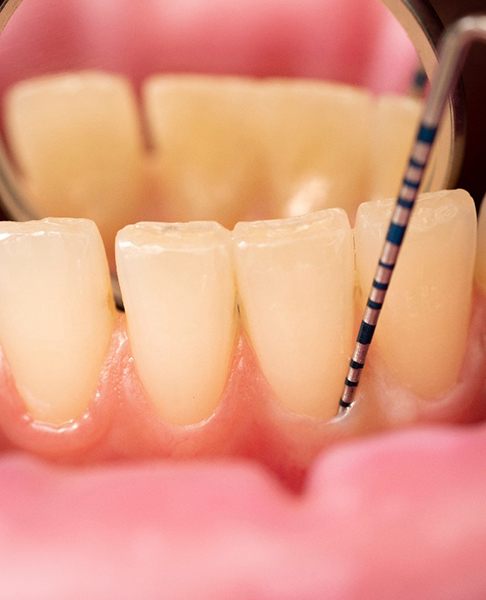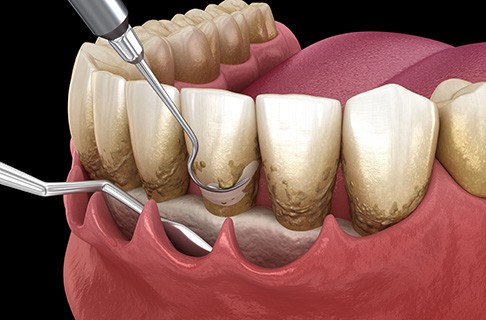Periodontal Therapy – Dallas, TX
Protecting Your Smile from Gum Disease

If you notice that your gums have become red and swollen, tend to bleed easily, or have started to pull back and expose more of your tooth roots, you need to get in touch with Dr. Barnett and the rest of our team right away – you most likely have gum disease. Ignoring gum disease for too long can easily lead to tooth loss, but fortunately, we offer plenty of options for periodontal therapy in Dallas, TX, treating the soft tissues in your mouth so that your smile can continue to function properly and painlessly.
Why Choose Lincoln Park Periodontal and Dental Implant Group for Periodontal Therapy?
- Periodontal Office Led by Board-Certified Periodontist
- Focus on Honest, Evidence-Based Treatment Plans
- Minimally Invasive Treatments for Ideal Results
What is Gum Disease?
Gum disease is a bacterial infection that develops in the soft oral tissues surrounding teeth. As bad oral bacteria forms, it begins to attack the gums, causing redness and inflammation. Over time, if left untreated, it can progress into more advanced stages, resulting in bone and tooth loss as well as problems that develop throughout the body.
Symptoms of Gum Disease

To know if you have gum disease, you’ll need to schedule an appointment with a member of our dental team. But in case you’re wondering what signs and symptoms to look for that might indicate a problem, below are a few to watch for:
- Oral sores that do not heal
- Bad breath
- Red, inflamed, and bleeding gums
- Receding gums
- Difficulty chewing
- A change in your bite
Treatment Options for Gum Disease
Treating gum disease can occur in many different ways. Once you’ve met with our team, we will determine which service(s) will best align with your needs so that you can enjoy healthier, longer-lasting results.
Scaling and Root Planing
The earliest stage of gum disease, gingivitis, can often be reversed altogether with regular dental cleaning (as long as it’s followed up by good brushing and flossing habits). However, during the more advanced stages, scaling and root planing are required to eliminate the plaque and tartar that have built up around the roots and gum line. The roots will also be smoothed out, removing the rough surfaces that bacteria love to cling to.
Oral Cancer Screening
In addition to checking for signs of gum disease, we’ll also be on the lookout for potential symptoms of oral cancer. Even people who don’t drink or use tobacco are still at risk for cancers of the mouth, and the survival rate is much higher for those who seek treatment as early as possible. Unusual growths, mouth sores that don’t heal, and white patches can all be signs that you need a biopsy in the near future.
Arestin Antibiotic Therapy
Oral bacteria can hide deep in your gum tissue – in many cases, deeper than we can reach with scaling and root planing. Antibiotics allow us to continue to fight gum disease wherever it might be hiding. We can prescribe a few different kinds of antibiotics depending on your case and how severe your gum disease currently is. Combining antibiotic treatment with other periodontal procedures tends to yield the best results in the long term.
Periodontal Maintenance
In some ways, periodontal maintenance looks like regular teeth cleaning, in that it involves the removal of plaque and tartar that has built up in your mouth. The difference is that periodontal maintenance is prescribed after you have already developed gum disease; it’s meant to keep the bacteria levels in your mouth under control to prevent future infections. We normally schedule periodontal maintenance visits every three to four months.
Periodontal Disease & Whole-Body Connection
You might think that treating gum disease is solely intended for protecting your smile, and while that’s definitely one of our biggest goals, we also consider the effect that the infection is having on the rest of your body. Gum disease has been linked to heart attacks, strokes, and many other health problems; the longer it goes untreated, the higher your risk for additional conditions becomes. We’ll be sure to go over the various conditions that can be exacerbated by gum disease with you so that you have a full picture of what you need to do to protect your health.
Treatments for Bruxism
Grinding your teeth can damage your enamel as well as your gum tissue. Unfortunately, many people grind their teeth while they’re asleep, meaning they have little to no control over it. The underlying cause of teeth grinding is often unknown, but in most cases, we can protect your smile with an occlusal splint, which is a removable oral appliance that keeps the upper and lower teeth separated to prevent unnecessary wear and tear of the enamel.
The Importance of Treating Gum Disease Early

Treating gum disease in its earliest stages will give you the best opportunity to move forward in life with a healthier smile. But it’s not only your oral health that is at stake. Your overall well-being can be negatively impacted if gum disease is not treated promptly. Some of the most common problems that can develop due to periodontitis include:
- Heart attack
- Stroke
- Diabetes
- High blood pressure
- Cognitive disorders (i.e., Alzheimer’s, Dementia)
- Respiratory disease
- And more
This is why it’s important not to waste time seeing a dentist to undergo appropriate treatment for gum disease as soon as you notice any symptoms.
Scaling & Root Planing

The main cause of gum disease is bad bacteria, so the typical treatment for it is scaling and root planing. This two-part service is a deep cleaning that removes plaque from teeth and gum pockets. At the initial “scaling” visit, our team does the initial removal work and gets rid of the harmful microbes. We’ll proceed to the “root planing” at the second session, when we’ll smooth out the roots of your teeth so your gums can reattach healthily. For more details, please keep reading or call us.
Do I Need Scaling & Root Planing?

Given their training, only a dentist can know for sure if you need scaling and root planing. However, it’s still a good idea to watch for signs that you’d benefit from a deep cleaning. These include:
- Visible buildup of plaque
- Swollen or puffy gums
- Persistent bad breath (i.e., halitosis)
- Sensitive or bleeding gums
- Receding gum tissue
Early gum disease signs can be reversed with good oral care, but you’ll need scaling and root planing if your infection advances. Only treatment will keep you from getting worse at that point.
The Process of Scaling & Root Planing

The scaling and root planing process tends to take two dental visits. As such, it can be broken down into parts: the initial “scaling” and the subsequent “root planing.”
For your first visit, our periodontists will do a “scaling” of your smile. This step relies on a scaler to clear out plaque and tartar from the surfaces of your teeth. In doing so, it moves as far down as the pockets of your gums.
The later “root planing” occurs during the second appointment. At that time, we’ll remove hard bacterial deposits that cling to your tooth roots. Such deposits are beneath the gumline, so removing them stops bacteria from re-infecting your gums.
Aftercare Tips for Scaling & Root Planing

Because scaling and root planing are invasive, your mouth will need a few weeks to heal from it. Your teeth and gums may feel rather sensitive and sore during this period. To better manage your discomfort, use these aftercare tips:
- Brush Gently – In the first days after treatment, brush your teeth gently, and don’t use a toothbrush with hard bristles. Instead, try brushing in slow, circular motions and rely on a soft-bristled toothbrush. These habits will prevent discomfort.
- Rinse with Salt Water – Soon after your meals, try to rinse your gums with salt water. This trick should reduce your gum irritation and loosen the debris around your teeth. To make the salt water mixture, use ¼ teaspoon salt for eight ounces of water.
- Avoid Certain Meals – Please don’t have hot and spicy foods, alcohol, or acidic drinks while healing. If you do, such items will inflame and irritate your gums.
- Don’t Rush – Avoid intense physical activities for the first few days after treatment. If you move around too much, you may delay the healing process.
Gum Disease Treatment FAQs
Can Gum Disease Cause Overall Health Issues?
Yes, gum disease can cause overall health issues. Research has shown that the inflammation and bacteria associated with this condition can enter the bloodstream, potentially impacting various parts of the body. This can increase the risk of serious health conditions such as heart disease, stroke, diabetes, and respiratory problems.
Gum disease has also been linked to complications in pregnancy, including low birth weight and preterm birth. Additionally, individuals with chronic conditions like diabetes may find that gum disease worsens their symptoms and makes it more difficult to manage their blood sugar levels.
Will My Insurance Cover Gum Disease Treatment?
It depends! Dental insurance coverage for gum disease treatment varies depending on your plan. Most policies cover preventive care, such as cleanings and exams, which can help prevent gum disease. When it comes to gum disease treatment, many plans cover at least a portion of the costs for procedures like deep cleanings (scaling and root planing), periodontal maintenance, and even surgery if necessary.
It’s important to review your specific policy details to understand the extent of coverage, including any deductibles, copayments, or annual maximums that may apply. Be sure to contact your insurance provider directly or consult with our office for clarity on what to expect.
Is Gum Disease Treatment Necessary?
Absolutely! Untreated gum disease can progress from gingivitis (mild inflammation) to periodontitis (severe infection), leading to significant oral health problems. Advanced gum disease can cause tooth loss, damage to the jawbone, and persistent bad breath.
Beyond oral health, gum disease has been linked to systemic health issues, including heart disease, diabetes, and respiratory problems. Treating gum disease early helps prevent these complications and maintains overall health.
Is Gum Disease Treatment Painful?
Gum disease treatment is generally not painful, especially with modern dental techniques and anesthesia options. Treatments like scaling and root planing may cause some discomfort, but local anesthesia is often used to numb the area, making the procedure more comfortable.
Following your treatment, you may experience some sensitivity or mild soreness, which can typically be managed with over-the-counter pain relievers and following your aftercare instructions. For advanced cases requiring surgical intervention, we’ll use sedation dentistry and provide pain management options to ensure a tolerable experience. Overall, the benefits of treating gum disease far outweigh the temporary discomfort, as it prevents more serious dental and health issues in the future.
